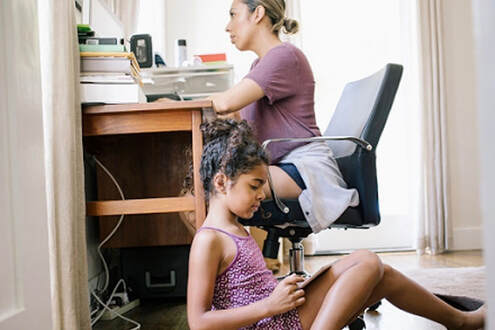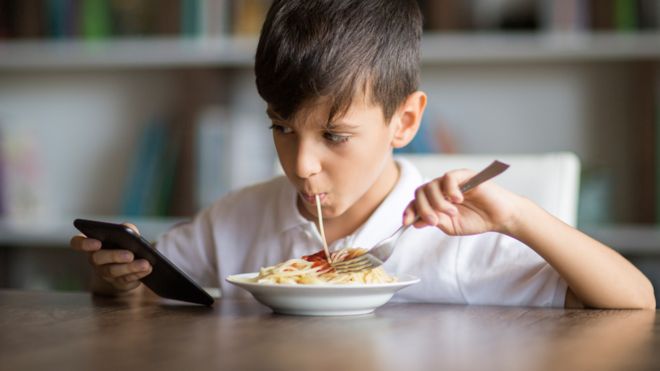|
Rahul is busy doing his homework while his mom is busy surfing the Internet on her latest smartphone. She answers his queries, encourages him on his good work and motivates him to do faster, all of these without looking away from her mobile. Dad comes back from office and the first thing he does is to settle on the couch and flip open his phone to check out latest updates! Friday nights are movie nights and the entire family sits in front of the television to see their favorite movie. Weekends too are spent watching interesting TV programs and chatting over WhatsApp. This is the life of today’s parents who fail to realize their own mistakes and addiction to electronic devices. Screen-based sedentary behavior is increasingly seen in most families all over the world and so is the concern about the effects of prolonged screen time on the health of kids and families. Children nowadays are exposed to a vast variety of electronic gadgets and grow up in a digital world, toddlers and infants as young as 6-month-olds are exposed to televisions and mobiles and this exposure is not restricted to their use of digital technology but is also affected by parent’s screen time behavior and routines too! Screen-based sedentary behavior that includes doing activities involving low energy expenditure such as playing on mobiles and watching television is growing to be one of the biggest public health concerns in adults as well as kids. This is also a major contributor to the growing obesity crisis in all ages of the population. The World Health Organization (WHO) states childhood obesity as a growing epidemic which is around 41 million in kids aged under 5 years. We do have intervention and observational studies showing that increased screen time engagement, mostly involving watching television, is a serious threat for rise in obesity rates in kids. It is also a serious risk factor for cardio-metabolic diseases, physical health problems and psychological diseases in kids and teens. Screen-time also has the potential to ruin self-esteem of kids, take away precious time that could be spent on other useful activities such as exercise, mental wellness and one’s personal improvement, associated with poor social skills and pave way for unrealistic body ideals and poor body satisfaction. Standing Up to Your Ideologies & Dreams It isn’t news that parents are a child’s first role model and, in this regard, too, parents play a critical role in affecting their child’s weight-related behavior and that includes screen time. Media parenting practices is the methods enforced by parents to help the child with restricted media use which finally determines overall screen time. While television viewing dominated screen time viewing decades back now it’s the era of smartphones and tablets which have overtaken TV viewing. Parenting practices mostly involve only mothers and fathers are rarely even a part of studies. An analysis of 103 studies found that only 57 of them included fathers and even these took up the combined efforts of media practices of both mother and father rather than treating their behavior exclusively. This is of great concern here as one study found that kids with an obese father and a normal-weight mother were 10 times likelier to be obese after 4 years than kids whose both parents were healthy and normal-weighted. Surprisingly, the same trend was not observed when the situation was reversed. Parents’ Media Practices & its Effect on Child’s Screen Time The study included data collected from the Guelph Family Health Study (GFHS) which was actually carried out to identify risk factors for obesity and chronic diseases earlier in the life of children. Families that had kids aged between 1.5 and 5 years were eligible for participation in the study and totally 39 families participated of which 25 families had data from both parents (totally there were 64 parents and 69 children), 92% families were two-parent households and the remaining 8% was single-parent households. Media parenting practices followed by parents was assessed using questionnaires which included those mentioned below: “When I am with my child I use a screen based device; Our family often watches a screen during mealtime; family members are allowed to use screen-based devices during meals; my kid falls asleep while using a screen-based device; I keep track of my kid’s screen time during weekends; I limit my child’s screen time during the week; and I gift my child with screen time as a reward for good behavior/I take away screen time away from my child as a punishment for bad behavior.” Parent one, defined as the first parent to enroll in the study, reported on the kid’s total recreational screen time during weekdays and weekends. Screen time, according to the questionnaire, is any time that is spent on screens such as television, cell phones, tablets, iPads and videogames. Two questions were asked to the parent:
The response options given were none, less than an hour per day, 2-3 hours per day, 4-6 hours per day and 7 or more hours per day which were coded as 0, 1, 2.5, 5 and 7 respectively. Parent and child weight, height and BMI details were collected after meticulous measurement of the same. Kids were aged around 3.5 years, parents were aged around 37 years, children had a BMI of 0.7, mothers had a BMI of 28 and fathers had a BMI of 27. Results showed that:
The study clearly shows that parents’ media parenting practices influence the amount of time children spend in front of the screen. Mealtime screening practices of both mom and dad showed that children spent more time in front of the screen during weekdays. So, steps taken to reduce mealtime screen time can help reducing overall screen time of kids. Also, using screen time to control behavior was positively associated with kid’s screen time. Fathers affect weekend screen time of their kids compared to weekday screen time as they are available only 58% times compared to a mother on weekdays and almost 86% times that of mothers during weekends. Limiting Screen Time Children whose parents have the ability to limit and mentor screen use reap benefits that are not possible in families due to both parents working or other financial constraints. Its been shown that parents who view programs along with their kids enable better learning abilities in children, positively affect their social interaction skills, sleep patterns and behaviors especially when they set time limits on permissible screen time during a day. Reinforcing positive habits and limiting screen time also depends on the parent’s ability to say ‘No’ to their kids wishes to play games and also on the parents’ beliefs and attitudes towards media screen time. Studies show that parents who spend more time using phones in restaurants invoked kids too to do the same while another study showed that parents who allowed their 1- to 4-year-old kids to use smartphones frequently also allowed them to use the same as a reward or distraction. This leads to unruly behavior by the children when parents refuse to submit to their requests of using smartphones frequently. When parents too use smartphones frequently, they are transported to another world which makes ‘in the moment’ interaction with their kids difficult. Children younger than five years need to be involved in quality family time and active play time to improve their language skills and be open to cognitive development. Parents must monitor screen time of their kids and this helps them to monitor and optimize their own screen time too which paves way for improved opportunities to play together, read and bond over.  Occupying Kids with Mobiles in Order to Finish Our Chores? Rethink Your Plan Occupying Kids with Mobiles in Order to Finish Our Chores? Rethink Your Plan Never use screens while you have a chance for interaction-in the car, during meals or at bedtime. If you don’t practice this, you fail in setting the grounds for developing a close-knitted family, it’s a sign that you are ok with your kids disengaging in these precious little moments of life and also makes it difficult for them to turn off screen time in future as they have been following such inappropriate practices. You start to develop the right kind of approach in kids by setting an example of yourself. Don’t engage in screen time once back from office, spend quality time with kids asking about their day and sharing your experience, keep phones in silent mode while going to sleep, turn off any electronic gadgets while having dinner or a conversation with loved ones and ensure to restrict your binge-watching sprees! This would make you and the entire family more active, happy and satisfied. References Mothers’ & Fathers’ media parenting practices associated with young children’s screen time: https://bmcobes.biomedcentral.com/articles/10.1186/s40608-018-0214-4 Screen time & young children: Promoting health and development in a digital world: https://academic.oup.com/pch/article/22/8/461/4392451
0 Comments
Leave a Reply. |
AVOID FRAUD. EAT SMART.+91 7846 800 800
AuthorDietitian & Nutritionist Dr. Nafeesa Imteyaz. Archives
July 2024
Categories
All
Dr. Nafeesa's Blog @blogspot |
- Home
- Written Testimonials
- Consult
- Clinics
- Blogs
-
Diet & Nutrition
- Diabetes Reversal
- IVF IUI not needed for PCOS PCOD Infertility
-
Medical Nutrition
>
-
Disease & Conditions
>
- Infertility | PCOS
- Diabetes Mellitus
- Cholesterol
- Hypothyroid
- Kidney Problems
- Hypertension
- Cardiovascular Diseases
- Liver Diseases
- Gastro intestinal disorder
- Cancer
- Metabolic Disorders
- Orthopedic Disorders
- Eating Disorders
- Dietary Recall
- Weight Record Filled By Clients
- Online Payment Transaction Details
- Online Clients Weight Check Form
- Our Program Package Service Charges
- Weight Record 2017 Clients
- Measurements sent by Clients
- Terms & Conditions Of Payment
- Thanks. Your Form is Submitted
- Video Testimonials
- Lifestyle & Wellness
- Lifestyle & Wellness Blog
- Allergy & Intolerance
- Weight Loss / Gain
- Weight Loss / Slimming Blog
-
Disease & Conditions
>
- Life Cycle Nutrition >
- Sports Nutrition >
- Integrity in Nutrition
- Knowledge Centre
© COPYRIGHT 2022. ALL RIGHTS RESERVED. FRST HEALTHCARE PVT LTD.
Dr. Nafeesa Imteyaz of First Eat Right clinic, is the Best Dietitian Nutritionist in Bangalore. Best Dietitian Nutritionist in Pune. Best Dietitian Nutritionist in Hyderabad. Best Dietitian Nutritionist in Chennai. Best Dietitian Nutritionist in Mumbai. Best Dietitian Nutritionist in Delhi. Best Dietitian Nutritionist in Kolkata.



